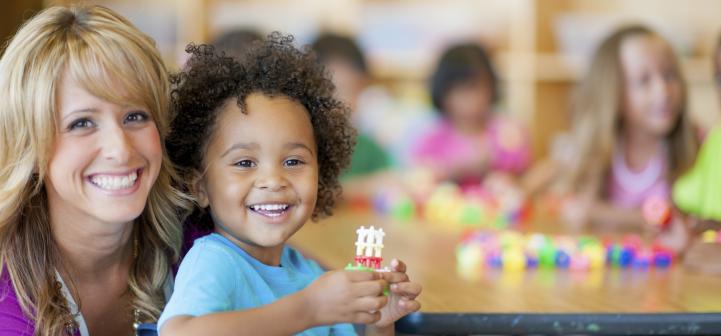
As a child care provider, you know the importance of familiar routines for young children. They like to know when and what to expect. This is especially true for military children. Every child experiences changes as part of normal life. But as someone who provides child care for military families, you know that the changes common to military children are super-sized:
- A parent is out of reach for long stretches of time…and then comes back, shaking everything up all over again.
- A parent comes home with an injury – maybe visible, maybe not – but looking or acting very different from the way the child remembers.
- The family leaves their house, loved ones, friends, and familiar places to make a new home in a place where nothing and no one is familiar.
- A single parent is deployed, and the child not only must cope with the loss of the parent’s presence but must also adjust to having a different primary caregiver, possibly in a different house and community.
There is no question that big changes are part of the military family package! And as hard as those changes are on parents, adults have an advantage over young children in that they have more resources to draw on to manage the upset that changes cause. Parents have the ability to understand why the changes are happening. They can put their feelings and thoughts about the situation into words. They’ve built up a toolkit of coping strategies to help them get through the rough patches. They know to take deep breaths, a warm bath, or a long bike ride. And they usually have the freedom to make those choices to manage their own stress.
Unlike adults, young children don’t yet have most of those personal resources to draw on. What they do have, however, are the faces, places, and routines in their child care setting that have become so familiar. Those familiar things can provide a great deal of comfort and support as a young child works through a major change in his or her family.
Familiar Routines and Environment
What a relief, then, for a child to be able to spend significant chunks of time in his child care setting, a place that’s so predictable and manageable! He knows right where to find everything he needs and can do lots of things for himself. He knows when free play and lunch and outdoor time are. He feels in control because he knows what to expect. He knows that there will be dozens of choices he can make during the day –- and because they are familiar choices, he knows what the results are likely to be. Because the child care environment is familiar, he can navigate it – he can use the bathroom, wash his hands, put away his toys, and put his coat on to go outside, all with confidence and a sense of belonging. The familiarity of the routines and the environment in the child care setting provide him with reassurance and confidence to better cope with the changes that he can’t control.
Familiar Things to Do
Being able to spend time playing with her favorite toys and friends can help a child regain a sense of relaxed enjoyment. Familiar physical activities like dancing to music, running outside, or playing with clay or water can help her body bring the stress hormone levels back down to normal levels. Becoming immersed in looking at her favorite books or creating with her favorite art materials can bring comfort and calm. It’s really no different from how adults cope – when we are feeling stressed, we often feel drawn to certain favorite activities that we can get lost in. They help calm us, and favorite activities can have the same effect on stressed children. Even favorite foods can help when a child is upset – they’re called “comfort foods” for a reason!
Familiar People
The important relationships that the military child has developed with his child care provider and with other children at child care become even more important during this time. He needs to know even more than usual that you are glad to see him when he comes in your door and that you’ll listen when he has something to say. He also needs to know that the behavior expectations and boundaries are still the same and that you’ll be there to guide and support him when he has difficulty managing himself. He will also find great comfort and strength in having friends he can count on to play with him. Although the friendships of early childhood aren’t usually as deeply committed as those in later childhood, they can still play a big role in meeting the emotional needs of young children.
A Place of Confidence and Comfort
When child care providers grasp the impact of familiar faces, places, and things to young children faced with big changes, they can better appreciate their role in making sure child care is a haven where children can feel confident, calm, and in control. The time military children spend in this place of confidence and comfort will help them be more resilient, to recharge their batteries emotionally so that they can cope with the challenges of change.
For More Information
To learn more about providing child care for young children from military families, check out the following eXtension Alliance for Better Child Care articles.
- Coping with Change: Practical Ways That Child Care Providers Can Support Young Children from Military Families
- How Child Care Providers Can Help Deployed Parents and Their Children Stay Connected
- Reflections of Military Life in Children’s Pretend Play
- What Child Care Providers Need to Understand about Stress in Military Children
You can also read more in our Child Care and Military Families blog.
